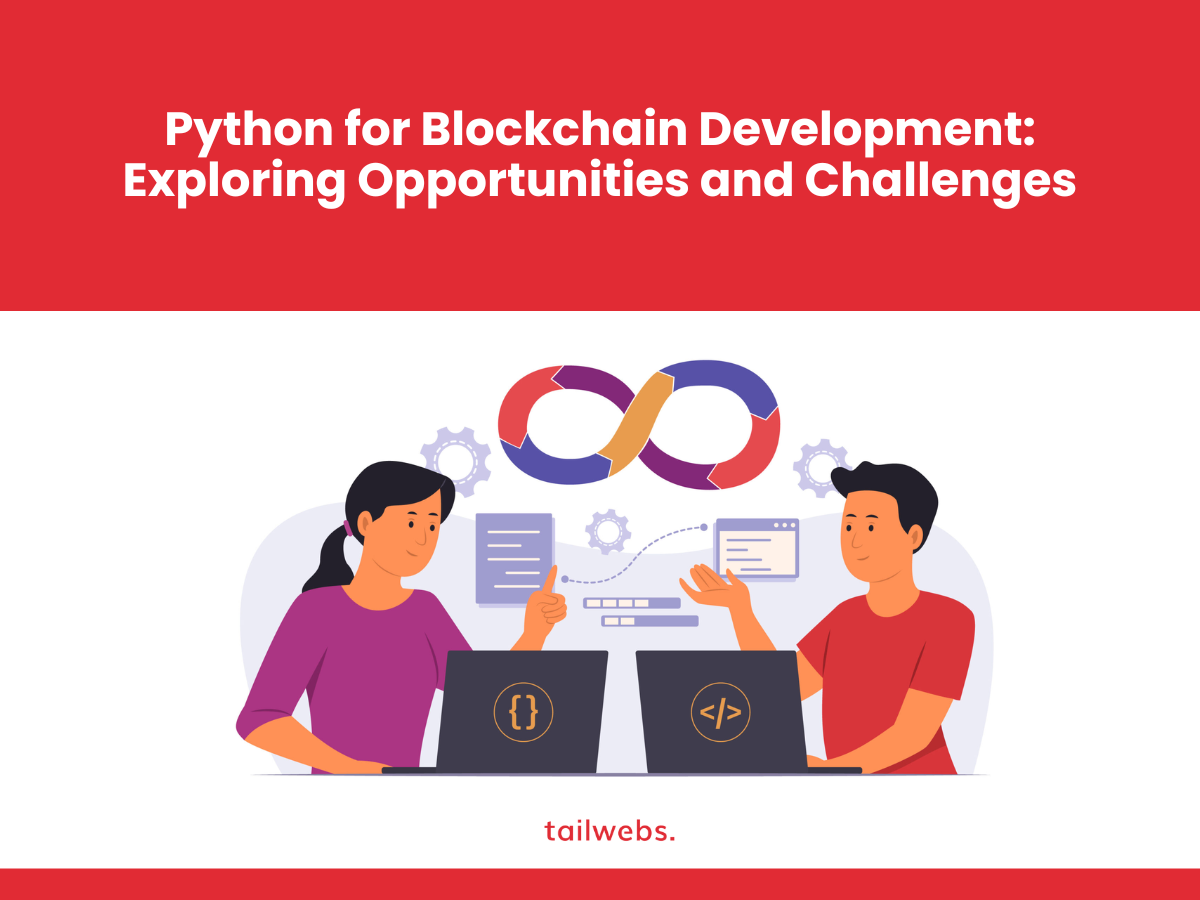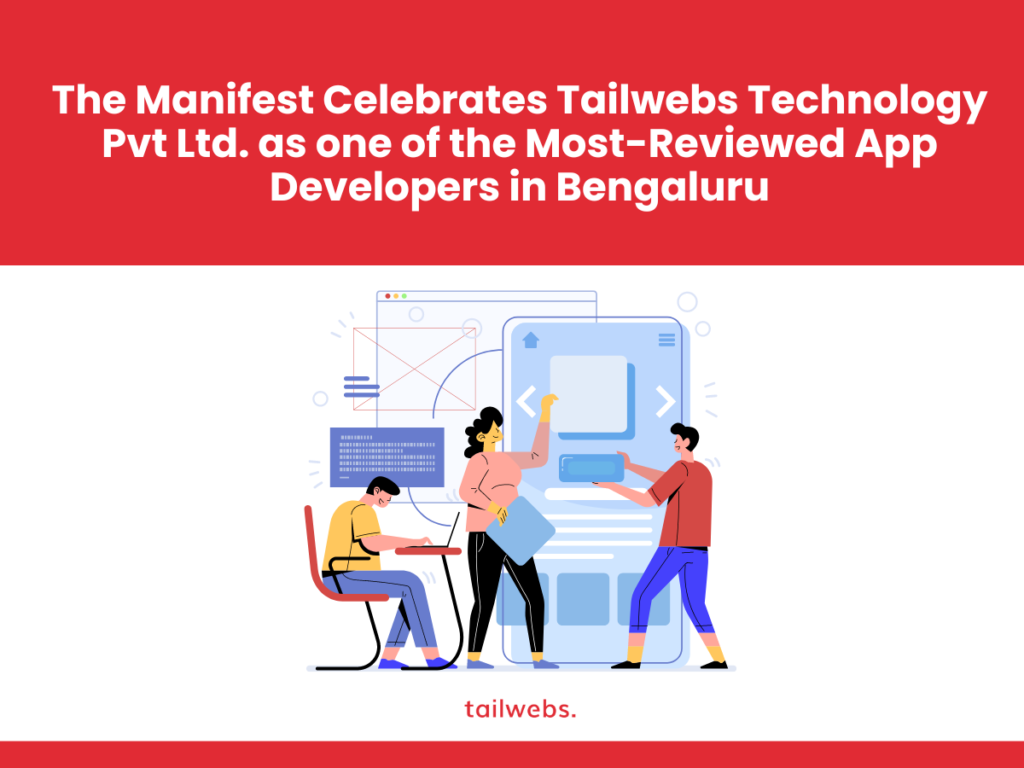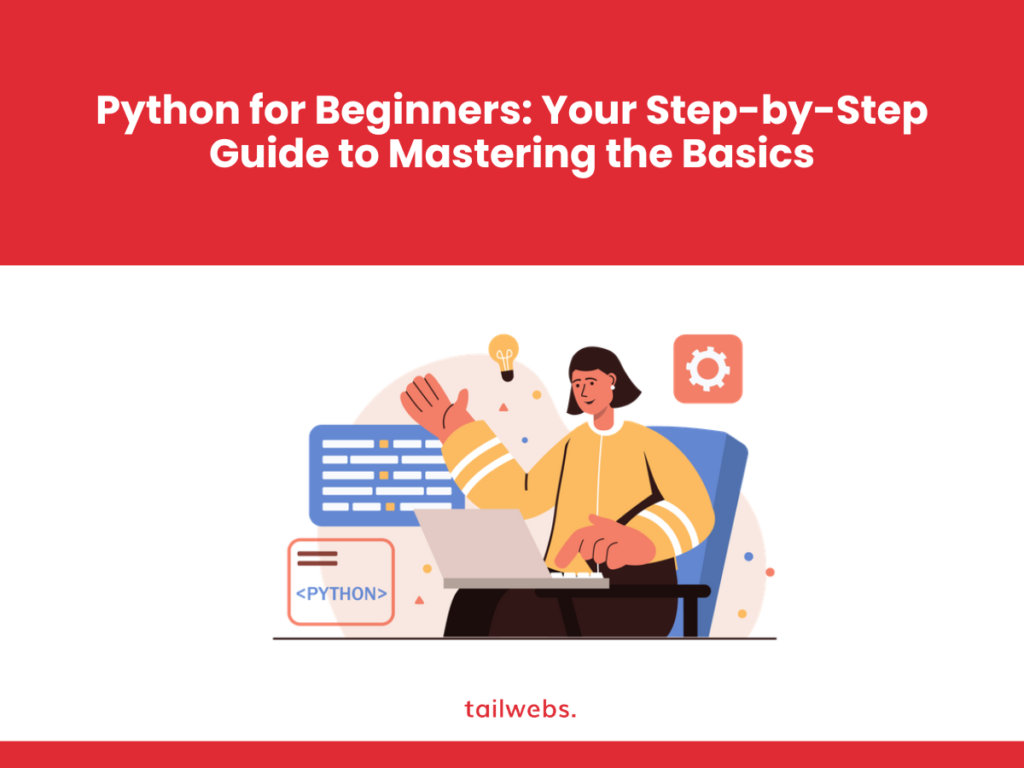Blockchain technology has revolutionized various industries, from finance and supply chain management to healthcare and voting systems. As blockchain adoption continues to surge, the demand for skilled blockchain developers rises. Here, Python emerges as a popular choice for building robust and scalable blockchain applications.
This comprehensive guide explores the opportunities and challenges associated with using Python for blockchain development. We’ll delve into Python’s suitability for blockchain projects, explore key libraries and frameworks, and discuss the advantages and potential drawbacks of using Python in this dynamic field.
Why Consider Python for Blockchain Development?
Python’s popularity in blockchain development can be attributed to several factors:
Readability and Simplicity:
Python boasts a clear, concise syntax, often referred to as “pseudocode.” This makes it easier to learn, write, and maintain complex blockchain code, even for developers with no prior blockchain experience.
Extensive Libraries and Frameworks:
Python offers a rich ecosystem of libraries and frameworks specifically designed for blockchain development. Libraries like hashlib, web3.py, and Brownie simplify tasks like cryptography, smart contract interaction, and blockchain network communication.
Large and Active Community:
Python enjoys a vast and active developer community. This translates to readily available resources, tutorials, and support for troubleshooting challenges encountered during blockchain development.
Versatility and Scalability:
Python is a versatile language, well-suited for various development tasks beyond just blockchain. This allows developers to leverage their Python expertise across different aspects of a blockchain project.
Integration with Other Technologies:
Python integrates seamlessly with various technologies commonly used in blockchain development, such as web frameworks (Django, Flask) and data science libraries (NumPy, Pandas).
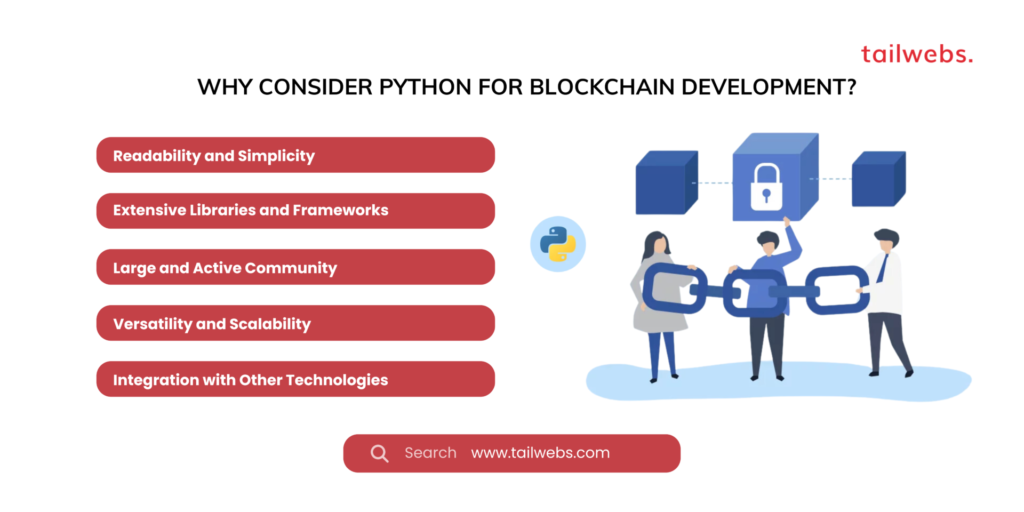
Key Python Libraries and Frameworks for Blockchain Development
Here’s a closer look at some of the most valuable Python libraries and frameworks for blockchain development:
hashlib:
This built-in library provides cryptographic hash functions, essential for ensuring data integrity and security within blockchain applications.
web3.py:
This popular library allows interaction with the Ethereum blockchain. Developers can use web3.py to deploy smart contracts, execute transactions, and access data stored on the Ethereum network.
Brownie:
Brownie is a Python-based framework specifically designed for smart contract development. It offers a streamlined development environment for writing, testing, and deploying smart contracts on various blockchain platforms.
Hyperledger Fabric:
This open-source framework allows building permissioned blockchains for private or consortium use cases. Python is one of the primary supported languages for developing applications on Hyperledger Fabric.
Sawtooth SDK:
Another permissioned blockchain framework, Sawtooth, utilizes Python as its primary development language. The Sawtooth SDK provides tools for building secure and scalable blockchain applications for specific industry needs.
Opportunities in Python for Blockchain Development
The rise of blockchain technology presents exciting opportunities for Python developers:
Smart Contract Development:
Python’s readability and extensive libraries make it ideal for writing secure and efficient smart contracts, the self-executing code that powers decentralized applications (dApps).
Decentralized Finance (DeFi):
DeFi, a rapidly growing sector within blockchain, offers numerous opportunities for Python developers to build innovative financial applications like lending platforms, automated market makers, and more.
Supply Chain Management:
Blockchain technology can revolutionize supply chain management by ensuring transparency and traceability. Python developers can leverage their skills to build applications that track goods and materials throughout the supply chain.
Internet of Things (IoT) Integration:
The convergence of blockchain and IoT has the potential to create a secure and transparent ecosystem for connected devices. Python’s versatility allows developers to build applications that bridge the gap between blockchain and IoT technologies.
These are just a few examples, and as blockchain technology continues to evolve, new opportunities will undoubtedly emerge for Python developers in various industries.
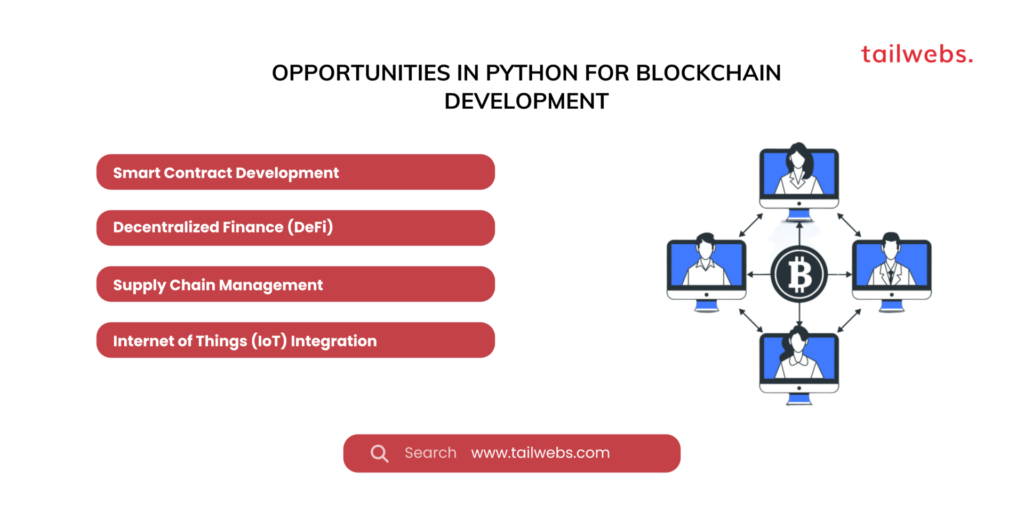
Challenges of Using Python for Blockchain Development
While Python offers significant advantages, there are also some challenges to consider:
Performance:
Compared to languages like C++, Python might not be the most performant choice for highly resource-intensive blockchain applications. However, ongoing advancements in Python optimization techniques and the use of libraries like Cython can help mitigate this challenge.
Scalability:
Scalability concerns can arise when dealing with high-volume blockchain applications. While Python can handle various use cases, for extremely large-scale blockchain projects, other languages like Java or Go might be better suited for optimal scalability.
Limited Blockchain-Specific Libraries:
While Python boasts a rich ecosystem of libraries, the selection of blockchain-specific libraries is still evolving compared to languages with a longer history in blockchain development. However, the Python blockchain development community is actively expanding the available libraries and frameworks.
Overcoming Challenges in Python Blockchain Development
While Python offers significant advantages, the identified challenges can be addressed through strategic approaches:
Performance Optimization:
Cython:
Consider using Cython, a tool that translates Python code into optimized C extensions, enhancing performance for computationally intensive tasks within your blockchain application.
Focus on Algorithmic Efficiency:
Prioritize well-optimized algorithms and data structures within your Python code to improve overall application performance.
Scalability Considerations:
Horizontal Scaling:
For high-volume blockchain applications, explore horizontal scaling techniques by distributing workloads across multiple machines running Python code.
Focus on Modular Design:
By implementing a modular design approach, you can potentially isolate performance bottlenecks and rewrite specific modules in more performant languages like C++ if necessary.
Limited Blockchain Libraries:
Stay Updated:
The Python blockchain development ecosystem is constantly evolving. Keep yourself informed about the latest libraries and frameworks emerging to address specific blockchain development needs.
Contribute to Open-Source Projects:
Consider contributing to open-source libraries and frameworks to expand the available Python toolkit for blockchain development.
By implementing these strategies, you can mitigate the potential drawbacks of using Python for blockchain development and leverage its strengths to build robust and scalable blockchain applications.
Career Prospects for Python Blockchain Developers
The demand for skilled blockchain developers is rapidly increasing. Here’s what Python developers can expect in the job market:
High Demand and Salaries:
With the rise of blockchain technology across various industries, the demand for Python blockchain developers is high, leading to potentially attractive salaries and compensation packages.
Diverse Job Opportunities:
Python’s versatility allows developers to explore opportunities in various sectors, from finance and supply chain management to healthcare and voting systems.
Career Growth Potential:
The blockchain industry is still young and evolving. As the technology matures, early adopters with Python blockchain development skills can position themselves for significant career growth.
The Future of Python in Blockchain Development
Looking ahead, Python’s role in blockchain development is expected to remain prominent:
Evolving Libraries and Frameworks:
The Python blockchain development community is continuously innovating. Expect a wider range of specialized libraries and frameworks to emerge, further simplifying and streamlining blockchain application development using Python.
Focus on Interoperability:
As blockchain platforms evolve, interoperability between different blockchains will become increasingly crucial. Python’s versatility can play a significant role in building applications that bridge the gap between different blockchain ecosystems.
Integration with Artificial Intelligence (AI):
The convergence of blockchain and AI presents exciting possibilities. Python’s strength in both domains positions it well for developing intelligent blockchain applications powered by AI and machine learning.
By staying informed about these trends and honing your Python blockchain development skills, you can position yourself to be at the forefront of this exciting and rapidly evolving technological landscape.
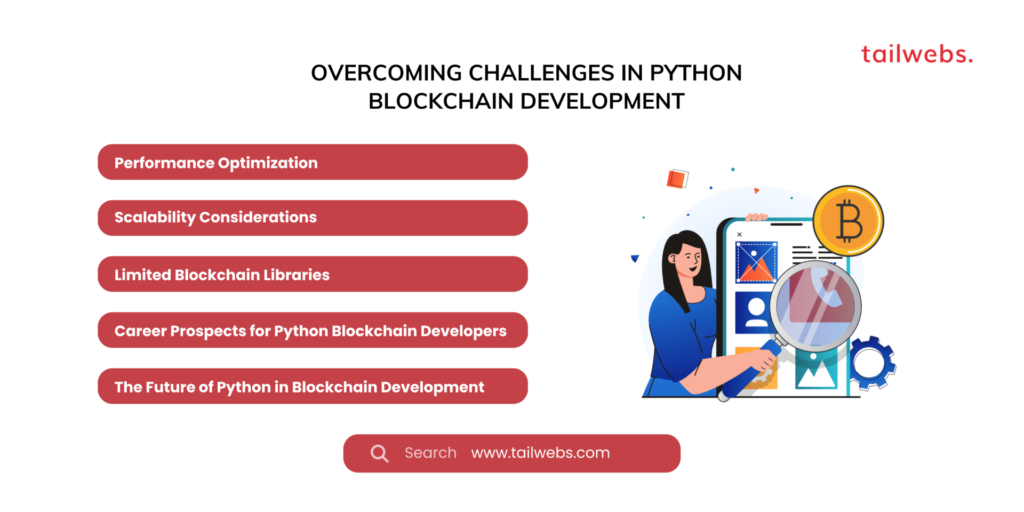
In Conclusion: A Rewarding Journey with Python and Blockchain
Python offers a powerful and accessible entry point into the world of blockchain development. Its readability, extensive libraries, and large developer community make it an attractive choice for developers of all experience levels. While some challenges exist, they can be addressed through strategic optimization techniques and a focus on continuous learning.
The future of Python in blockchain development is bright. As the technology matures and new opportunities emerge, Python developers with the right skillset can carve a successful path in this dynamic and transformative field. If you’re a Python developer looking to expand your skillset and explore the exciting world of blockchain, now is the perfect time to embark on this rewarding journey.
